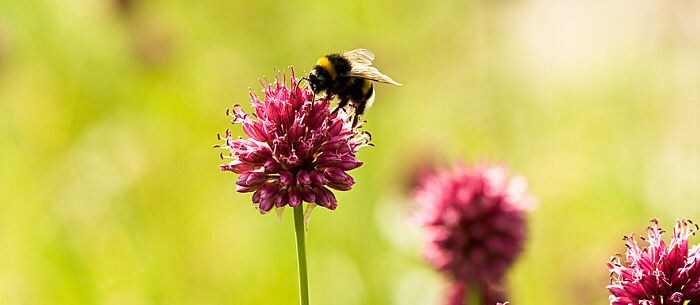Have seasonal allergy symptoms such as sneezing, an itchy nose and coughing got your child down? Have you ever thought of using honey for allergies? If your kids have seasonal allergies, you’re probably willing to try anything to ease their symptoms especially something yummy like honey. And for natural-minded moms, honey may offer a natural alternative to conventional allergy medications that can cause a number of side effects, including headaches, drowsiness and digestion issues.
Many allergy sufferers report that eating raw, locally produced honey alleviates their seasonal allergy symptoms. The idea is that eating a small amount each day helps build immunity through gradual exposure. Bees transfer a small amount of pollen spores, those same spores that give allergy sufferers so many problems to their honey.
The theory is that eating the honey with those spores can desensitize the immune system. “It’s the same principal as allergy shots, where patients are given very small amounts of the substance they’re allergic to. Over time, the immune system will recognize the offender so it doesn’t launch an attack,” explains Dr. Julie Glass, a naturopathic doctor in Portland, Oregon. Honey won’t help with food or other allergies, of course, but it could possibly help with seasonal allergies.
There has been some anecdotal evidence showing that using honey a few months before allergy season starts acts as a preventative measure against developing seasonal allergies. Two recent (but small) studies produced slightly differing results.
- A 2011 study assessed patients with a birch pollen allergy. By the end of the study, only the patients who’d ingested birch pollen honey instead of their usual allergy medication experienced a significant reduction in symptoms and twice as many asymptomatic days.
- A 2013 study found that after eight weeks, a group of subjects who had ingested honey as well as allergy medicine showed more improvement in allergic rhinitis symptoms than subjects who had only ingested allergy medication.
These studies, however, were very small. Dr. Meera Gupta, an assistant professor in the departments of internal medicine and pediatrics at The University of Texas Medical Branch at Galveston, points out, “these results have not been consistently duplicated in larger clinical studies, and no studies have been done in children.”
Don’t Give Honey To Kids Under 1 Year Old
There may not be any harm in giving an older child honey, but both doctors warn you should not give honey to a child younger than 1 year of age due to the risk of botulism, which is a serious disease caused by bacteria called Clostridium botulinum. Symptoms include blurred vision, drooping eyelids and difficulty swallowing. “Once a toddler reaches 1 year of age, their digestive system is typically mature enough to kill any botulism germs,” says Dr. Gupta.
Talk to Your Health Care Provider
Before you give your child honey medicinally, contact your pediatrician or naturopathic doctor. “Honey may be a natural substance,” says Dr. Gupta, “but you need to use larger does when you use it medicinally. That’s when you need to speak with a health care provider” first.
Giving your child honey for allergies may help relieve your child’s allergy symptoms, but it isn’t something you should do without the guidance of a health care professional. And keep in mind that a spoonful of honey is, nutritionally speaking, a spoonful of sugar. At the very least, you may want your child to brush his teeth after consuming the honey.
Additionally, Dr. Gupta warns that, rarely, honey can cause allergic reactions ranging from swelling to anaphylaxis in patients with seasonal allergies or with severe allergies to bee stings. As Dr. Glass says, “Too much of a good thing isn’t necessarily a good thing.”
For more on allergies, read All About Toddler Allergies: Symptoms and Treatment.
Rebecca Desfosse is a freelance writer specializing in parenting and family topics.
* This article is for general informational purposes only. It is not intended nor implied to be providing medical advice and is not a substitute for such advice. The reader should always consult a health care provider concerning any medical condition or treatment plan. Neither Care.com nor the author assumes any responsibility or liability with respect to use of any information contained herein.




